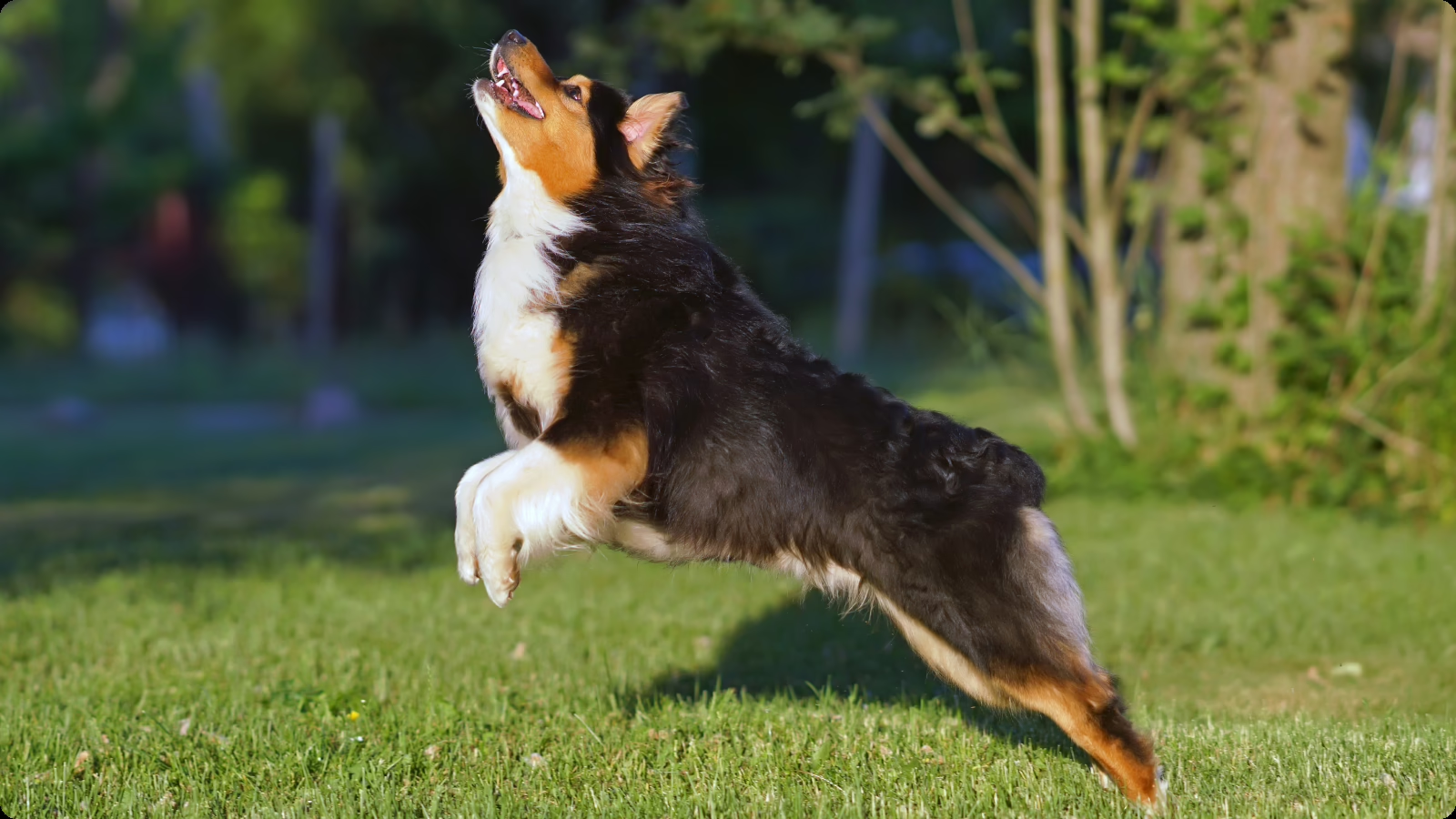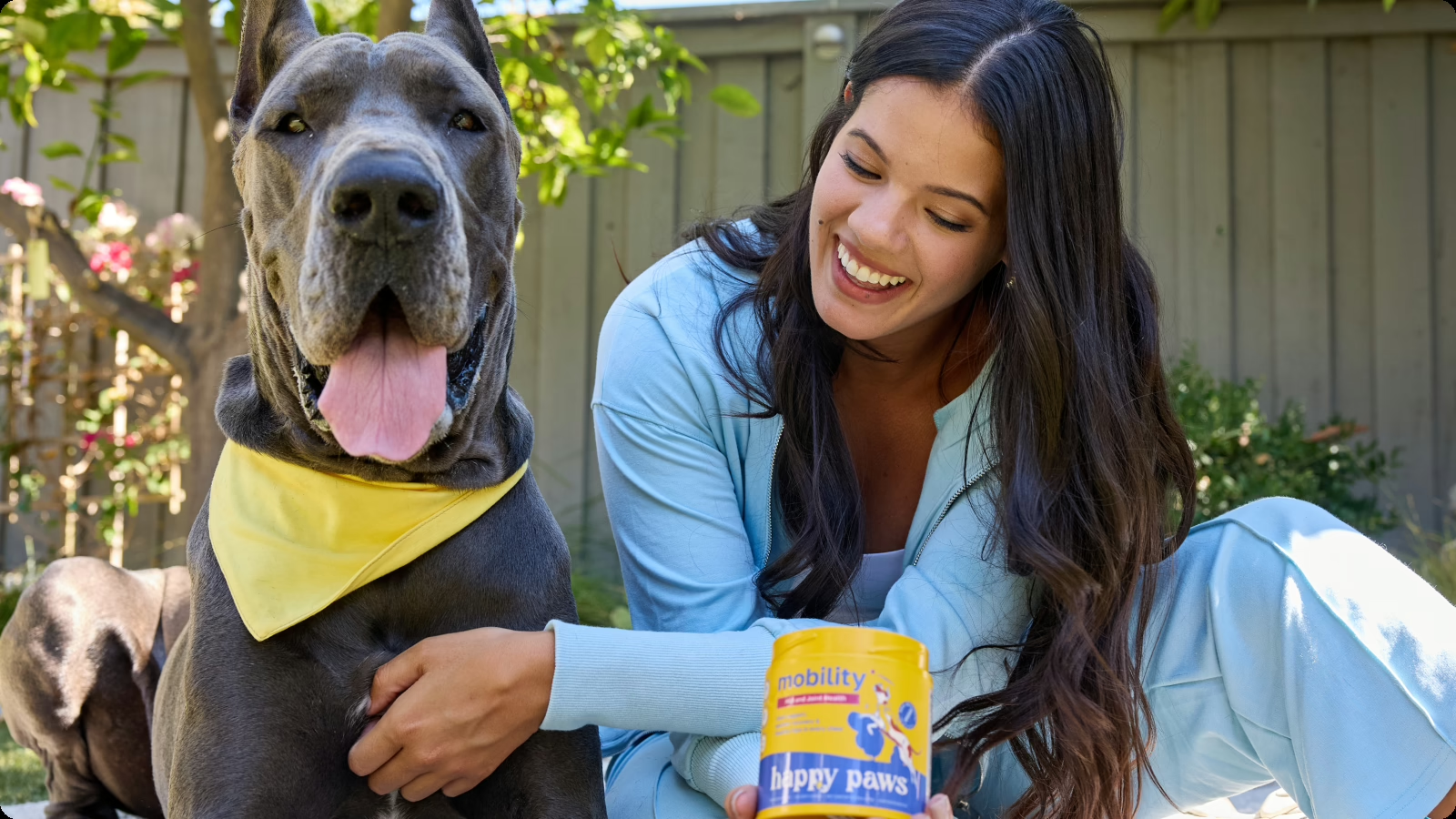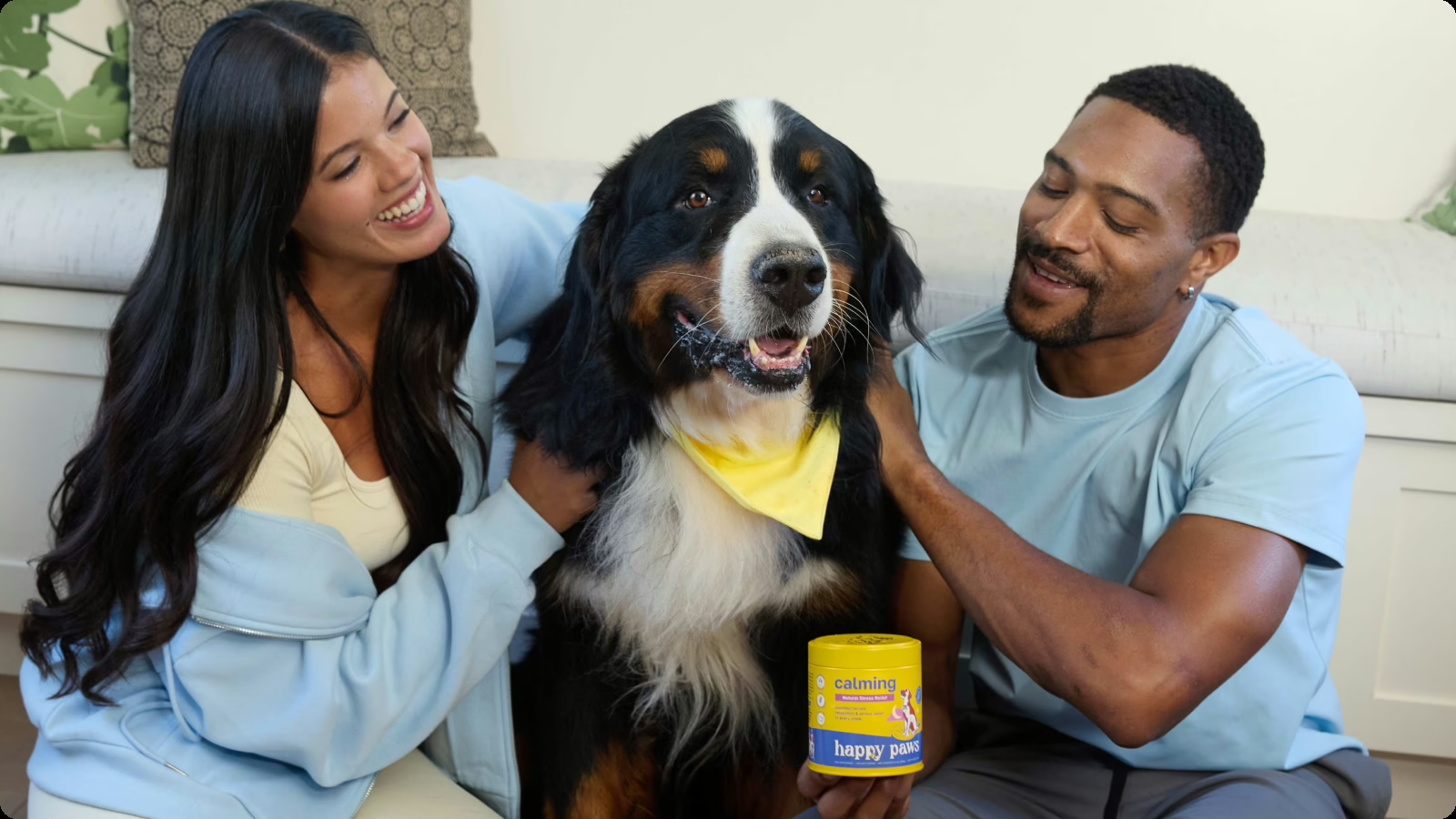Loyal, Affectionate Guard Dogs
With their formidable features, Doberman Pinschers have garnered quite a reputation as intimidating guard dogs. But behind that tough exterior, this stoic giant is more than just a protective pup. A Doberman is a sweet, loyal hound, eager to please, and deeply affectionate; you just have to earn their trust first.
At Happy Paws, we’re dedicated to helping all dogs, from purebreds to certified mutts, live their happiest, healthiest lives. We’ve designed our dog supplements to target a range of trouble spots in your dog’s health—many of which include common issues for a Doberman.
In this article, we’ll explore the history of this protective pinscher, provide some information and tips on how to care for them, and help you decide which supplements are best for your tough yet sensitive pupper, the Doberman.
Quick Facts
Origin: Germany
Size: Large
Breed Group: Working
Lifespan: 10–12 years
Coat: Short hair—minimal grooming recommended
Temperament: Intelligent, fearless, loyal & keen
Exercise Needs: A Doberman Pinscher is typically high energy and very intelligent, so playtime should consist of mental and physical exercises.
Training: Like any dog, obedience training is necessary for a Doberman. But don’t worry, they’ll love it! Doberman puppies flourish when there’s work to be done, and obedience training lets them flaunt their intelligence. Continue daily training well into adulthood to help keep your Doberman’s mind sharp.
Dog Health: A Doberman is a strong, agile dog that can generally thrive on a high-quality commercial-grade diet. But they’re not without their unique health challenges. Common problems Dobermans face include hip dysplasia, digestive problems, and allergies. We’ll discuss how to address each below.
Happy Paws for Dobermans
Enrich your Doberman’s health with high-quality, tasty supplements like these!
| Type of Happy Paws Supplement | Best for … |
| Cognitive Dog Chews | Promoting brain health & mental clarity. |
| Digestive Health Dog Chews | Supporting healthy digestion & a strong gut flora. |
| 10-in-1 Multivitamin Dog Chews | Giving your pupper a daily dose of essential vitamins, minerals & other nutrients. |
| Hip & Joint Dog Chews | Soothing common symptoms of joint dysplasia & inflammation. |
| Probiotic Dog Chews | Restoring the healthy bacteria in your dog’s digestive system. |
In-Depth Look at These Popular Supplements
A Doberman can be the perfect addition to your family. This loyal, protective breed never takes a day off, so why should their supplements?
Our high-quality, tail-waggin’ dog supplements use an array of all-natural, organic ingredients to enrich your Doberman’s physical and mental health, while satisfying their taste buds. Here are a few dog supplements to help you care for your dog.
Cognitive Dog Chews: Dobermans are known for being smart, intuitive animals, and our Cognitive Dog Chews help sharpen their minds well into their twilight years. These vegan, chicken-flavored chews use an array of vitamins, minerals, and other nutrients to promote optimal brain health and fight against cognitive decline.
Digestive Health Dog Chews: Our Digestive Health Dog Chews use powerful, all-natural probiotics and enzymes to enrich your dog’s gut health and strengthen their digestive system. These healthy, tasty dog treats offer a delicious pumpkin flavor that spoils your pet’s palate while fortifying their gut flora.
10-in-1 Multivitamin Dog Chews: Our 10-in-1 Multivitamin Dog Chews use multiple essential nutrients to strengthen your dog’s daily health and give them a well-rounded supplement. One vegan, lamb-flavored dog treat introduces ten critical nutrients to keep your dog healthy, happy, and active.
Hip & Joint Dog Chews: Soothe the symptoms of joint dysplasia with our Hip & Joint Dog Chews! Packed with a blend of joint-friendly ingredients, this dog supplement helps reduce inflammation and support joint health, thanks to compounds like glucosamine, chondroitin, and hyaluronic acid.
Probiotic Dog Chews: Made with powerful antioxidants, probiotics, and superfoods, our Probiotic Dog Chews help strengthen your dog’s digestive system, while supporting their gut and bowel health.
Common Doberman Health Concerns
Like other large dog breeds, Dobermans are often prone to common health issues like these:
Elbow & Hip Dysplasia: According to the American Kennel Club (AKC), many medium-sized to extra-large dog breeds are susceptible to elbow and hip dysplasia. This issue arises from birth when the bone in a joint is misshapen, causing an awkward fit in your dog’s joints. This defect can often lead to joint pain, osteoarthritis, limping, and trouble standing up.
Digestive Issues: Large to giant breeds commonly have digestive problems, like bloating. These issues can stem from their diet, lifestyle, or genetics.
Cardiovascular Disease: Dobermans are genetically predisposed to cardiovascular problems. So, feeding them a vitamin-rich, nutrient-packed diet is essential to help fortify their heart health.
Allergies: Seasonal allergies can affect this breed, like many other types of dogs. Typically, allergies will present as a skin rash coupled with scratching and itching. A strengthened immune system can help combat these common allergies.
Info About Dobermans
The Doberman’s origins start with a 19th-century German tax collector, Louis Dobermann, who set out to breed a protective, loyal dog. He needed a forbidding sidekick to tow along on his tax-collecting duties. His efforts yielded him an intelligent, alert dog with a commanding presence.
With their towering, tough appearance, Dobermans have been used as guard dogs, police dogs, and military search-and-rescue dogs. Their large frame and sleek musculature perform well under pressure, while their keen intelligence makes them smart and dependable.
But today, they’ve somewhat shed that tough exterior, trading it in for a domesticated life. You can now find Dobermans frolicking in the front yard, running with their owner, or tapping into their protective nature and patrolling the world from their couch (yes, it’s their couch).
Their Temperament
Dobermans were bred to be loyal companions, and that trait remains strong. Once you’ve earned a Doberman’s trust, you’ve earned a friend for life. But this deep trust can make these dogs wary of strangers and newcomers. So, early socialization will help your Doberman get comfortable around new faces.
A Doberman can be relatively high-energy, so it’s important to exercise them daily. If you don’t, they can misplace their energy toward destructive behaviors, like gnawing on your favorite shoes or chasing the cat around the living room.
How to Care for a Doberman
Dobermans are fairly easy dogs to train with minimal grooming maintenance. They learn fast and have short, smooth hair. But there are a few tips to help keep your Doberman happy, healthy, and lively, from their puppy years and well into their golden years.
Puppy Training
Most Dobermans grow up to be tall, long, and strong, clocking in at just under a hundred pounds. So, these large dogs can cause quite the trouble without the proper puppy training. It’s best to train your Doberman when they’re young, tapping into their perceptive instincts and obedient nature from an early age. A Doberman aims to please, so reward good behavior with loving pats, verbal encouragement, and plenty of healthy treats. Puppy training will help lay the foundation for a wonderfully behaved family dog—who has a pretty intimidating side-eye.
Daily Exercise
Like other strong, active breeds, Dobermans need plenty of daily exercise. This exercise can include long walks, hikes, or runs. They love involved play, so fetch, tug-of-war, and other games will become life-long favorites.
Time Outdoors
While many Dobermans love lounging out and being couch potatoes, they also treasure running around outside. This is a very active, energetic breed, so keeping them cooped up inside isn’t best for their mental or physical health. Take them along on hikes, camping trips, or park activities. Maybe they can show off that tremendous length by reaching up for a wayward frisbee.
Happy Paws: High-Quality Dog Supplements
Keeping your dog happy, healthy, and active shouldn’t feel like a full-time job. At Happy Paws, we’ve designed our dog treats with the best ingredients and flavors possible (our dogs definitely approve!). We’ve made sure these treats are certified organic, non-GMO, and third-party tested for purity, letting you spoil your dog easily with healthy, tasty dog treats.
FAQ
Is a Doberman a good family dog?
Dobermans can be good family dogs if they’ve been socialized with other dogs, pets, and children early in their life. These dogs are fiercely loyal and affectionate. Their protective instincts will certainly help keep your family safe. But, as with any dog, it’s best to start training when the dog is a puppy. This early start will help your dog understand how to behave appropriately around children and elderly family members or friends.
Are Dobermans high maintenance?
In terms of grooming, Dobermans are reasonably low maintenance. But, they can be pretty needy, earning the nickname “Velcro dogs.” Dobermans have a deep dependence on human companionship, so they shouldn’t be left alone for long periods of time.
Does a Doberman bark a lot?
Doberman Pinschers can bark when on high alert or in protective mode. If your Doberman barks even when danger isn’t afoot, obedience training can help.
How do you give a Doberman health supplements?
You can give your dog a Happy Paws health supplement in several ways. First, we’ve designed these supplements as dog treats, so you can give them to your pupper as a reward for good behavior. Or, you can add it to your dog’s kibble; they make a pretty tasty topper, too.





